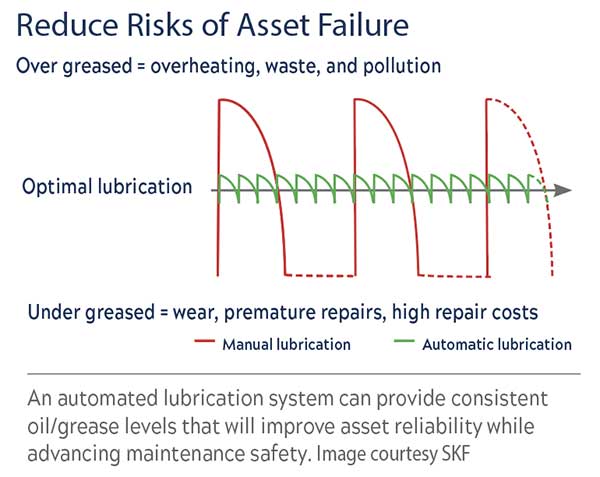ALS Units Advance Safety, Reliability
EP Editorial Staff | October 1, 2022
By Scott Smith, Motion
OSHA, Washington (osha.gov), estimates that 120 fatalities and 50,000 injuries are prevented each year by proper lockout/tagout (LOTO). With insurance and injury costs rising, guarding and LOTO areas will continue to grow. As equipment manufacturers and end users expand their machine guarding to improve safety and minimize risk, how can the machinery itself be maintained safely and cost effectively? Many are leveraging automated lubrication systems (ALS).
Lubrication of power transmission and other moving parts must be done frequently and is necessary to ensure proper component life. When the machine or moving apparatus is well guarded, removing the guarding to access lubrication points requires the machine to be shut down and the energy source locked out. This process results in machine downtime and production loss.
Proper asset lubrication, according to the manufacturer’s recommendations, can and will increase product output and save costly repairs. Too often, plants use employees on light duty to perform lubrication. Unless they have been properly trained, you will most likely have issues. Any plant with an active reliability-centered maintenance program can show you the results.
In many instances, doubts about lubrication consistency can be eliminated by installing ALS units because they:
• reduce risk of failure by providing the correct type and amount of lubrication—at the right time—while the machine is moving
• eliminate manual intervention, i.e., under- or over-lubrication
• offer system monitoring capabilities, specifically alarms and go/no-go indication.
In addition, the facility can realize the following benefits:
• increased production—eliminates the need to LOTO the machine to perform lubrication tasks
• improved safety—prevents accidents that can happen during manual lubrication, lessens exposure to harmful chemicals, and reduces climbing over and around machinery
• increased efficiency—the grease or oil pump can be mounted in an easy-access area for servicing
• maximized equipment reliability within LOTO areas.
The trend of expanded LOTO areas will only increase in the coming years to continue to keep workers safe and reduce injury risk and cost. This growth, coupled with reduced maintenance staff levels at many companies, provides the perfect opportunity for increased use of automated lubrication systems. EP
Scott Smith is West Group Fluid Power Manager at Motion, Birmingham, AL (motion.com). A certified fluid power specialist, he has more than 35 years of experience in the fluid-power and industrial-distribution business, including more than 12 years with Motion. He holds a degree in manufacturing engineering from the Oregon Institute of Technology.










View Comments